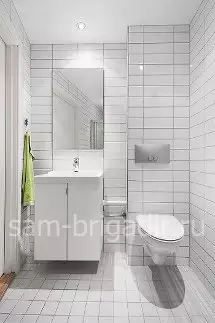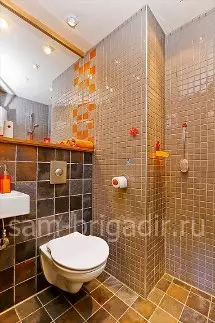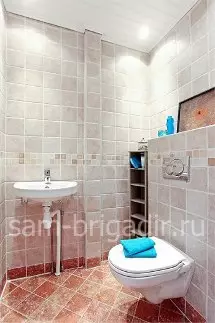
This is far from the very first indicator about which we think by choosing a wall or floor covering. And in vain, because from the thickness of the tile largely affects its physicomechanical indicators, in particular, for strength.
This parameter may vary in fairly wide limits. The most common are tiles with a thickness of 4-9mm. Specialized types of material (for floor covering in industrial premises) can reach 250mm, but in domestic conditions, you will not come across such products.
The pattern is obvious: the larger the dimensions (length x height), the thicker. For example, square - 150 x 150mm - ceramic: 5mm thickness. Small, decorative - 50 x 50mm - 4mm thickness. The probability of finding more subtle will be extremely small.
The fact is that with a decrease in the thickness of the tile, its strength characteristics sharply decrease, especially in terms of shock influences and pressure. The opposite statement is true: the thicker, the more stronger.
There is another, less pleasant, regularity - the thicker, the more expensive it is.
Wall ceramic tile thickness
Lower than outdoor. For wall works, material from 4mm and above, up to 9 mm. It is not beneficial to use for cladding walls, in most cases. The reason is not only in increasing the value of the ceramics itself, but also in the fact that it increases the weight of the facing, and this complicates its technology.The thickness of the wall ceramic tile may exceed 9mm, but it is already a material with special properties, which is used in singular rooms.
Outdoor ceramic tile thickness
On the contrary, from 8mm just begins. And that, such material can only be used for floors with low loads. Fortunately, the floor cladding will not go under their own weight, so nothing but financial constraints does not prevent you from using tile thread. But too, it is not necessary to go to extremes to extremes, as it is not necessary to use the material in domestic purposes, thicker 12mm is an unjustified consumption of funds.
Article on the topic: Where to throw out the construction trash?
The optimal for the floor in the apartment or house is 9-11mm.
This does not apply to the utility room, the type of garage. In this case, the thickness of the ceramic flooring can exceed 12mm, but you should not take 16mm thicker.




And what should be the glue layer for reliable tile hold on site?
It is also far from the first question that arises in the man's head when laying, and completely in vain.
The recommended thickness of the glue for work is usually indicated on the package with it. With wall work, the thickness of the adhesive composition should be at the level of 3-5mm, depending on the presence of the walls of the walls and weight of the tile (the more massive tile and more defects - the greater the glue layer).
For floor tiles, approach is the same.
- Ideally smooth floor: layer - 4mm;
- The dimensions of the tiles exceed 300 x 300mm: 7mm;
- Floor irregularities: 9mm;
- Paul can be called curves? We take the highest place for the point of reference and measure the layer of glue layer with a thickness of 4mm. Next, we support this level, despite irregularities. Thus, the thickness of the glue can reach 20mm. If there is a need to lay the adhesive composition in a layer, more than 20mm, it is recommended to first execute the floor alignment, and then go to the facing.
